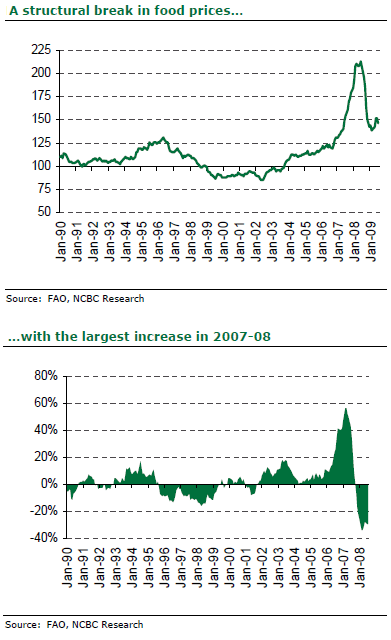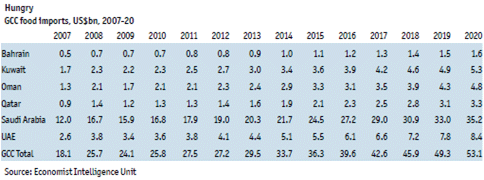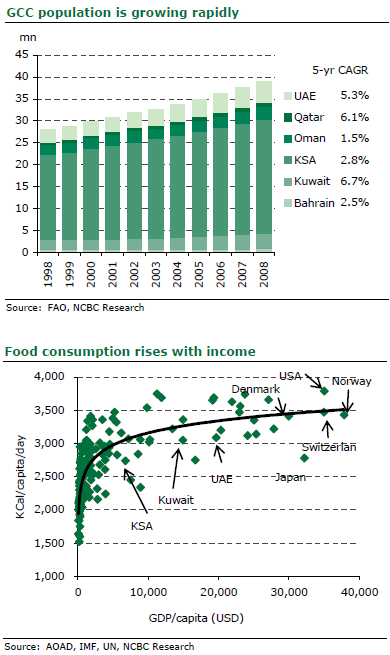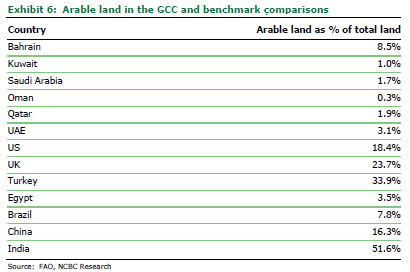The induction of Morocco and Jordan into the Gulf Cooperation Council would present an opportunity to unify efforts and complement strengths among these countries in the agribusiness sector. This extended cooperation would improve food security for Gulf nations, provided proper government policies are adopted.
Wealthy GCC countries are extremely dependent on food imports to meet their consumption needs. "Although GCC countries are amongst the world's richest in terms of oil and gas reserves and per capita wealth, they are highly dependent on the world food markets," Sameena Ahmad, Managing Director at Alpen Capital, wrote in a recent research report.
This high dependence on imports makes Gulf countries vulnerable to shocks in global food commodity prices, similar to the one that occurred in 2008. The food price spike of 2008 will stay in the background of GCC policymaking for many years to come.
"A number of Gulf countries were on the market for food at a time when prices had gone up, and some exporting countries had put up export bans, especially for rice -- creating a nervousness that even if they could afford it, they couldn't get it," Ruth Meinzen-Dick, senior research fellow at the International Food Policy Research Institute, said in a research report by the Economist Intelligence Unit.
By 2020 the GCC population is forecast to rise by 30% over the level in 2000 to reach 53.5 million, according to EIU. In addition, it expects the region's real GDP to grow by 56% over the same period, with nominal GDP set to reach more than USD 2 trillion in 2020.

Over the short term, GCC countries will remain vulnerable to higher food import costs which they can easily finance with a massive surplus from oil revenues. However, with around 90% of its food needs imported, there is also the added risk of embargoes on food exports by some countries. The Gulf countries thus have clear incentives to adopt policies that provide long-term solutions for this issue.

More Cooperation, Better Security
The region can be better positioned in terms of food security by expanding agricultural cooperation with Morocco and Jordan with more tax breaks and less trade barriers, fostering a more liberalized agricultural trade among these countries.
In addition, GCC governments are seeking to outsource agricultural production by acquiring land abroad as one of the strategies to ensure more food supply; especially since only 1.7% of the total GCC land area is arable. Morocco's wealth of exploitable agricultural land creates an opportunity in line with that strategy.
A GCC committee has been formed for the task of hunting for overseas land suitable for agricultural investments. Saudi Arabia and the UAE together already hold around 2.8 million hectares of overseas land in countries that have under-invested in their agricultural sector, primarily in North Africa and South Asia, according to media reports.
"The Kingdom of Saudi Arabia and the United Arab Emirates have been pioneers in utilizing resource-rich land in foreign developing countries, namely Pakistan and Sudan, for producing agricultural products and then exporting them back to the Gulf countries." Mhammad Biygautane, a researcher and expert in North African politics and governance at the Dubai School of Governance (DSG), told Zawya.

One of the options feasible for GCC nations is either buying or leasing farmland abroad; which is an option that can involve the private sector as well. Morocco's under-utilized land is considered a suitable destination in this aspect. In fact, there are massive areas of exploitable agricultural lands in Morocco, with approximately 85,000 square kilometers of arable land, one-seventh of which can be irrigated, combined with the advantageous factor of a mild Mediterranean climate along with skilled labor in this field.
"Morocco has substantial areas of fertile land that amounts to 85,000 square km and a Mediterranean climate that suits a diversity of agricultural products that can be grown either in the relatively cold north or warmer south of Morocco. "says Biygautane
Employing around 40% of the country's workforce, Morocco's agricultural sector is considered the largest employer in the kingdom.
However, the North African kingdom suffers financial constraints that limit its investments in its high-potential agricultural sector. These constraints can be eased by the rich GCC states that have the wealth but not the land. If a proper policy of cooperation is adopted, this strategy won't just be some form of "land grab", but rather a development opportunity for all countries involved.
"Morocco has a wealth of natural resources, but the limited financial resources are strict barriers in front of a full utilization of these resources. In contrast, the GCC countries enjoy abundant financial resources but lack the weather, the land, labor and skills required to invest in agriculture. Thus, both parties have excellent comparative advantages necessary for a successful cooperation." adds Biygautane
But for this policy to be sustainable, the GCC countries' investments in lands in Morocco need to take into consideration the consequences on the host country. It needs to improve the efficiency and productivity of the agricultural sector, so that Morocco's food security and rural development is enhanced as well.
In fact, farmers across many host nations of such leased or sold farms have voiced opposition to deals with GCC countries. Thailand, for example, banned farmland sales to Gulf investors after it witnessed a wave of protests against such deals in the summer of 2009.
This policy of acquiring overseas land also faces competition from other global players like China that had long adopted this strategy as a means to ensure its populous nation's food needs. These factors have created some kind of race for "land grab" in countries rich in arable lands. The GCC countries would certainly have a preferential treatment in this aspect with Morocco if it is included in the Gulf bloc.
Over the last decade, Morocco has leased more than 80,000 hectares drawing more than MAD 13 billion. Almost t one fourth of the investors in those farms were foreigners. The kingdom also launched the "The Green Plan", under which it plans to invest around MAD 200 billion by 2020. The Morocco government also targets contribution of the farming sector to the GDP by an additional MAD 100 billion by that date with more incentives to investors in this sector.
"GCC investment in Moroccan agriculture sector will foster the successful implementation of Morocco's Green Plan by providing the financial resources needed to create research and development centers, modernizing the machinery and technology used to plant and harvest land." Biygautane adds.
Intensifying agricultural cooperation with GCC countries, with a potential expansion of the council, falls in line with Morocco's Green Plan. Alternatively, from the GCC's perspective, establishing stronger political ties with the host county of overseas farmlands, Morocco in this case, minimizes the risks of food exports embargo that some countries resort to when local food supplies face shortages.
Jordan Valley
As for Jordan, agribusiness has been identified as a sector with potential by IFAD 2011 governing council. The Jordanian government targets a tremendous increase in capital investments in agriculture. In 2002, it adopted the National Strategy for Agricultural Development to limit rural exodus and establish economic equity between agriculture and other economic sectors. If Jordan joins the council, it would certainly offer a preferential treatment with more incentives and less barriers for GCC investors.
Despite scarcity in its natural resources, Jordan has improved its food security through the production of higher value products and the use of technologically modern farming. Jordan Valley, a USD 1.2 billion development, has been an agricultural achievement with more than a five times increase in arable land and a 30 times increase in production. The Jordan Valley offers rich and fertile soil with a unique climate to the entire region. Jordan is also the 8th largest producer of olive oil in the world, according to Jordan Investment Board.
Investments in the food manufacturing sector in Jordan, which employs around 35,000 people, reached over USD 2 billion, while local food exports were around USD 1 billion in 2010, according to Jordan's former Minister of Industry and Trade Amer Hadidi.
GCC countries can capitalize on Jordan's agribusiness and food manufacturing sector in a way that complements the region's food needs. The UAE, for example, invested in Jordan through many companies like the Rashid Al Dhahiri Olive Presses Company, Al Marmouqa Food Company, and Al Shalal for Agricultural Investment. Jordan-Dubai International Capital Company had also set up an ostrich farm in Jordan valued at JOD 319,000.
Although Jordan has not been competitive in the food market, it has been known for its fruits and vegetables exports. Its geographic proximity and a potentially more liberalized trade with GCC countries, if it is included in the council, would provide Gulf countries with food exports at much lower costs.
"Jordan is a country with agricultural export of fruit and vegetables to all countries, but having this kind of relationship will give GCC countries more strength," Bahraini MP Al Mahmood told local media in May 2011.
"We used to depend on Iran for fruit and vegetables but making this relationship with Jordan and Morocco will give us the necessary needs to offset the requirements of the Iranian side," he said.
Conclusion
Analysts agree that Arab countries need to have a unified position on agriculture for better food security for the entire region, especially because the Middle East and North Africa has higher export tariffs on agricultural goods than in most of the developing world.
Many analysts even argue if land in Morocco, Algeria, Libya, Sudan and Iraq were fully utilized, it could cover the needs of the rest of the region.
Thus, involving Morocco and Jordan intensively in a strategy of higher agribusiness cooperation, with a potential induction in the council, would only be one step in the GCC countries' pursuit of more sustainability and higher food security.
© Zawya 2011













